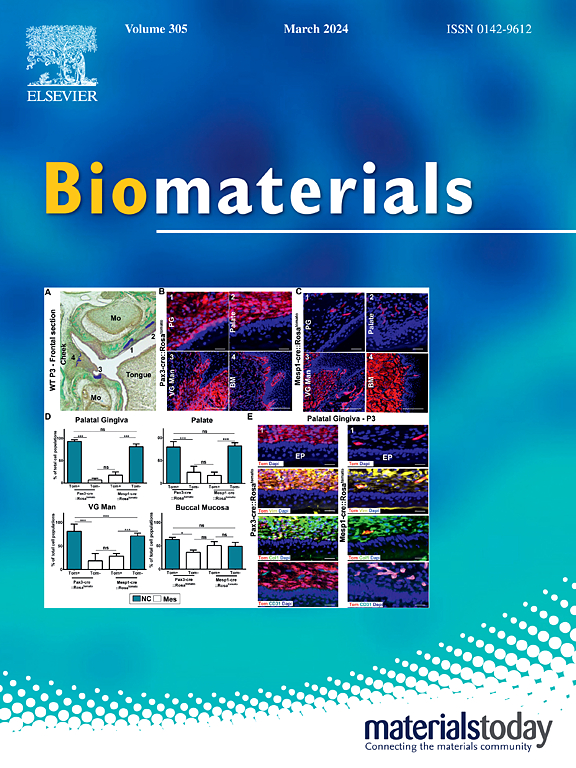Ultrasound-triggered lysosomal alkalinization to block autophagy in tumor therapy
IF 12.8
1区 医学
Q1 ENGINEERING, BIOMEDICAL
引用次数: 0
Abstract
Lysosomes play a crucial role in regulating cancer progression and drug resistance. However, there is a pressing need for the development of drugs that can safely and effectively modulate the pH of cancerous lysosomes in a controlled manner. In this study, we propose a novel strategy for lysosomal alkalinization triggered by piezoelectricity. Our findings indicate that the electrons generated by (BaTiO3/Zr/Ca) BCZT under sonication effectively alkalinize the lysosomes. Molecular dynamics simulations further demonstrate that alterations in lysosomal pH lead to modifications in the conformation of V-ATPase (proton pump), enhancing its interaction with sodium ions while partially excluding hydrogen ions from entering the lysosomes. This mechanism helps maintain lysosomal alkalization, resulting in reduced hydrolase activity and preventing the degradation of proteins and damaged organelles. The accumulation of nanoparticles within the lysosomes causes swelling and gradual destruction of the lysosomal membrane. Consequently, this lysosomal dysfunction hampers the fusion with autophagosomes, inhibiting autophagy in tumor cells and promoting apoptosis in various tumor types. Our strategy significantly inhibited tumor volume growth in mice during animal studies. In conclusion, our piezoelectric-triggered lysosomal alkalinization strategy holds promise for innovative breakthroughs in the treatment of multiple cancers.
超声触发溶酶体碱化阻断肿瘤自噬治疗
溶酶体在调节癌症进展和耐药性中起着至关重要的作用。然而,迫切需要开发出能够安全有效、可控地调节癌性溶酶体pH值的药物。在这项研究中,我们提出了一种由压电触发的溶酶体碱化的新策略。我们的研究结果表明,(BaTiO3/Zr/Ca) BCZT在超声作用下产生的电子能有效地碱化溶酶体。分子动力学模拟进一步表明,溶酶体pH值的改变导致v - atp酶(质子泵)构象的改变,增强其与钠离子的相互作用,同时部分排除氢离子进入溶酶体。这种机制有助于维持溶酶体碱化,导致水解酶活性降低,防止蛋白质降解和受损的细胞器。纳米颗粒在溶酶体内的积聚导致溶酶体膜的肿胀和逐渐破坏。因此,这种溶酶体功能障碍阻碍了与自噬体的融合,抑制了肿瘤细胞的自噬,促进了各种肿瘤类型的细胞凋亡。在动物实验中,我们的策略显著抑制了小鼠肿瘤体积的生长。总之,我们的压电触发溶酶体碱化策略有望在治疗多种癌症方面取得创新突破。
本文章由计算机程序翻译,如有差异,请以英文原文为准。
求助全文
约1分钟内获得全文
求助全文
来源期刊

Biomaterials
工程技术-材料科学:生物材料
CiteScore
26.00
自引率
2.90%
发文量
565
审稿时长
46 days
期刊介绍:
Biomaterials is an international journal covering the science and clinical application of biomaterials. A biomaterial is now defined as a substance that has been engineered to take a form which, alone or as part of a complex system, is used to direct, by control of interactions with components of living systems, the course of any therapeutic or diagnostic procedure. It is the aim of the journal to provide a peer-reviewed forum for the publication of original papers and authoritative review and opinion papers dealing with the most important issues facing the use of biomaterials in clinical practice. The scope of the journal covers the wide range of physical, biological and chemical sciences that underpin the design of biomaterials and the clinical disciplines in which they are used. These sciences include polymer synthesis and characterization, drug and gene vector design, the biology of the host response, immunology and toxicology and self assembly at the nanoscale. Clinical applications include the therapies of medical technology and regenerative medicine in all clinical disciplines, and diagnostic systems that reply on innovative contrast and sensing agents. The journal is relevant to areas such as cancer diagnosis and therapy, implantable devices, drug delivery systems, gene vectors, bionanotechnology and tissue engineering.
 求助内容:
求助内容: 应助结果提醒方式:
应助结果提醒方式:


